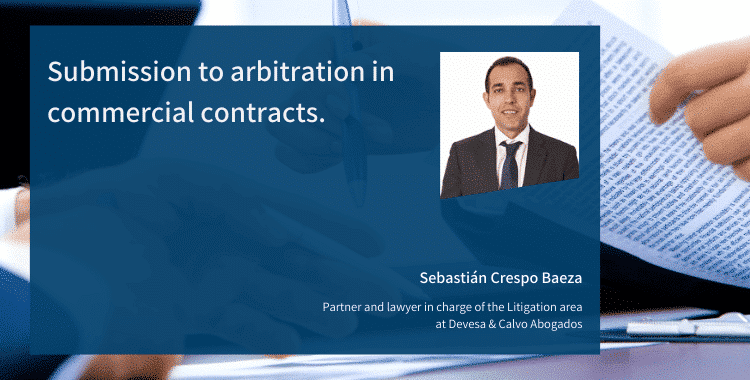
Submission to arbitration in commercial contracts.
It is common in the commercial contracts, collaboration agreements between companies, and agreements of intention, that contractual parties in addition to regulating the main business purpose, individual obligations, contractual terms, resolution causes, or confidentiality duties, they also have to agree before which jurisdiction they will submit to settle the controversies that may arise in the future regarding the contract’s fulfilment.
In other words, in several occasions for civil and commercial matters (except legal exceptions) in case of conflict, the parties have the faculty to agree to choose before which jurisdiction they want to be submitted to.
Although there are subjects like royalties, horizontal property or urban leases in which the Civil Procedural Law (LEC) establishes which is the competent jurisdiction to settle the conflict that has occurred, without disposition from the parties. In several cases, parties can choose to be submitted before Courts from different specific jurisdictions. These are called express-submission pacts.
Moreover, in those same cases, parties can decide to submit to arbitration excluding judicial intervention. This is very common but requires special care to specify the content of the contractual stipulations. Sometimes, the parts agree to submit to ‘arbitration’ but don’t indicate before which judicial body shall this arbitration be performed. Thus, it may lead to a significant amount of practical mistakes because of the unawareness of which is the adequate body, Entity or Chamber of Commerce that has to be attended, being necessary to reach an agreement between the parts after the arbitrator’s election, or in lack of agreement, to attend to a judicial procedure for the naming of the arbitrator which shall lead a delay of the conflict’s solution.
Furthermore, it is convenient to define if the arbitration will be resolved according to a specific jurisdiction and it is even more important to specify what type of law; if it has an international component, or if it will be resolved according to equity.
One of the advantages of the arbitration is the speed by which the duration of the procedure may extend only to a maximum of 6 months. After it finished, a resolution called “arbitral award” is delivered and can be executed before the Court as if it was a Court ruling. In addition to this, apart from all the inconveniences, we can outline the administrative costs that shall be paid to the arbitral court, the arbitrator’s fees and the fact that each Court uses individual regulations to rule the arbitration process.
Partner and lawyer in charge of the Litigation area at Devesa & Calvo Abogados
